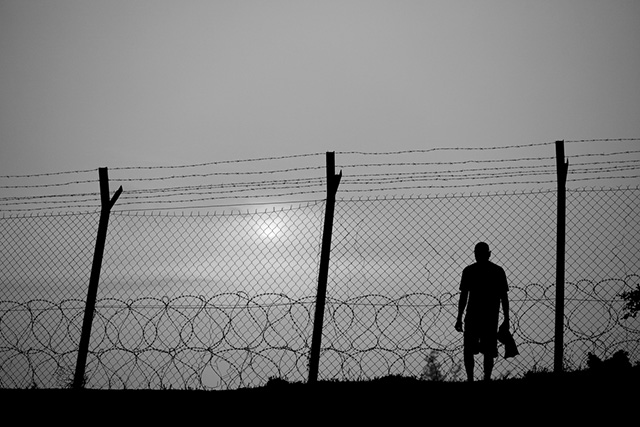
Support justice-driven, accurate and transparent news — make a quick donation to Truthout today!
Imagine sitting in a windowless 6-foot by 9-foot room the size of a bathroom for 23 hours a day, unable to communicate with family or anyone on the outside. The lights are on 24/7. The only drinking water you have is brown from rust. You constantly hear mentally ill people screaming and harming themselves. Within days of this torturous isolation you may begin to feel mental breakdown. Is this Guantánamo? Abu Ghraib? A torture chamber in some distant land? A torture chamber, yes, but a homegrown one.
This is solitary confinement in a state prison near you. The United States has many like the one in Dallas, Pennsylvania, a modern day dungeon, which imprisons people for years to face abuse and violence out of public view by guards paid with our tax dollars. But men inside also defend themselves and, even locked within their cells, try to fight back. One of those men was my son Carrington Keys.
Six black men – Andre Jacobs, Anthony Kelly, Anthony Locke, Duane Peters, Derrick Stanley and Carrington, now known as the Dallas 6 – blew the whistle and took nonviolent action to stop the abuse. It started when the Human Rights Coalition (HRC), a grassroots group of prisoners, ex-prisoners, activists and family members like myself, began receiving letters from prisoners alleging abuse. We built abuse logs with information about beatings; mental abuse; glass, metal, feces, spit, semen and urine in the food; mail tampering; deprivation of human contact; withholding medication; and starvation. Particularly upsetting to the men was the coerced suicide by guards of a mentally ill white man. “Seeing that body bag come out really shook me,” said Derrick Stanley, now free.
The men went through all the complaint channels. Carrington wrote to then District Attorney Jackie Musto Carroll informing her of the abuses and asking for help. She never replied. He filed a lawsuit against her for turning a blind eye. He informed the family of the man coerced into suicide and they sued and won an undisclosed sum.
HRC compiled the abuse logs into the Institutionalized Cruelty report. But instead of ceasing, the abuse escalated. On April 29, 2010, after young Isaac Sanchez was bound, naked and bloody, to a restraint chair for at least 16 hours (two hours is the legal limit), the men peacefully covered their cell windows to ask for outside intervention. Covering a cell window is a signal in Pennsylvania prisons done to summon a captain, who is required to come down, so that the prisoner can make complaints directly to him about a guard or circumstance that they have exhausted all other means to resolve. Instead, guards in riot gear pepper-sprayed, tasered and beat the unarmed men.
The six were originally charged with refusing to obey an order, a misconduct charge handled within prison. Four months later, however, after the assaults became public when HRC filed a criminal complaint against the Department of Corrections (DOC), Luzerne County District Attorney’s Office, the DOC and the state police conspired to charge these men with riot, a felony. Although former Luzerne County judges Mark Ciavarella Jr. and Michael Conahan now sit in prison for incarcerating youth for kickbacks (the “kids for cash” scandal), the corruption that enabled their outrageous crimes continues to flourish, as demonstrated by this malicious frame-up and cover-up.
A common wish of prisoners is to be treated like human beings. They expect to do their time and come out. While guards are not expected to be courteous or sociable, they are expected not to harass, threaten, shout racial slurs, provoke suicide or retaliate because you use your right to complain about their lack of professionalism and ethics. Whatever a person’s sentence, it does not include torture, abuse or murder. The law should be upheld. The guards and those covering up for them should be on trial, not the Dallas 6.
The Dallas 6 are part of a movement of prisoners, such as the California and Georgia prisoner hunger and work strikers, who use peaceful resistance to counter rampant abuses in solitary, crossing racial divides and ending hostilities among themselves to do so.
The Dallas 6 trial is scheduled for November 10. This is a landmark case for all who believe in justice, anti-racism and human rights. The public needs to know, and the decent guards need to be supported rather than letting their brutish colleagues dominate the DOC with their illegal sadism in prisons and courtrooms. We demand accountability.
Visit scidallas.blogspot.com and the Facebook page for the latest information.
Press freedom is under attack
As Trump cracks down on political speech, independent media is increasingly necessary.
Truthout produces reporting you won’t see in the mainstream: journalism from the frontlines of global conflict, interviews with grassroots movement leaders, high-quality legal analysis and more.
Our work is possible thanks to reader support. Help Truthout catalyze change and social justice — make a tax-deductible monthly or one-time donation today.